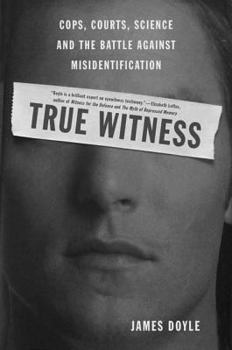True Witness: Cops, Courts, Science, and the Battle Against Misidentification
Honest but mistaken eyewitnesses are the leading cause of wrongful convictions in the United States. As the innocent go to prison their lives are shattered; as the criminal goes free, the public... This description may be from another edition of this product.
Format:Hardcover
Language:English
ISBN:1403964300
ISBN13:9781403964304
Release Date:January 2005
Publisher:Palgrave MacMillan
Length:223 Pages
Weight:1.10 lbs.
Dimensions:0.9" x 6.4" x 9.5"
Customer Reviews
5 ratings
An Exercise in Tuning Justice
Published by Thriftbooks.com User , 19 years ago
Combining humor, history and the upheaval from DNA-proved wrongful convictions, Doyle stunningly recounts the long, bumpy process of fine-tuning justice in the American criminal system. While focused on the history and frailties of eye witness identification, this book is for anyone evenly remotely connected to ... or interested in ... the criminal justice system: psychologists, lawyers, law enforcement, pre & post conviction professionals, judges, criminologists, forensic specialists and, especially, university personnel and students of these fields. Laugh aloud when you read about Mr. Potato Head. Cringe with Jennifer Thompson as she realizes that her honest but mistaken testimony sent an innocent man to jail. Worry whether Texas executed an innocent man, a man whose last words were "they are murdering me..." This is great reading. Doyle unveils his subject with care, drawing on his uncanny ability to observe and participate simultaneously. As Doyle acknowledges in his final remarks, the science of justice does not stand still. But Doyle has made a massive contribution to describing the process, and capturing one of those rare moments when the science lurches forward. You will enjoy this book.
New ammunition that improves accuracy by at least 50%!
Published by Thriftbooks.com User , 19 years ago
Doyle's story might be the "body armor" for eye witness identification. Science has produced highly effective and reasonably accessible materials to keep you safer on the street. Yet it does no good when you leave it in the trunk of your cruiser. Science has done the same for eye witness identification yet many have yet to unpack it from its box. Read Doyle's story and decide for yourself if you are being fair to your eye witness identifications or if you are just doing it "the way it's always been done around here." If you found new ammunition for your duty pistol that improved the accuracy of every round fired by at least 50%, would you continue to carry the same old duty ammo? When life-saving resources are at your disposal, don't leave them in the trunk.
Well-written, thought-provoking and entertaining
Published by Thriftbooks.com User , 19 years ago
I am interning as an Investigator for the Washington, DC Public Defender Service and thought I'd read this book to understand why some believe eyewitness testimony to be imperfect. So far, from 4 weeks on the job, the questions that the author puts forward in True Witness are dead-on. Even well-intentioned people make mistakes, and human memory is no camera. This book is full of examples that illustrate the author's main arguments, and it provides a nice balance of these true-life stories and a delving into the questions that the examples raise about the American legal system. I genuinely enjoyed the read, and learned a lot.
Well, Maybe I'm Not So Sure.........
Published by Thriftbooks.com User , 19 years ago
A wonderful book for members of the legal community as well as those who are intrigued and at times appalled by the criminal justice system. By using real cases, the author immediately engages the reader in a search to provide answers to the question of how well-intentioned and confident eyewitneses can be so wrong. Building on extensive historical research and documentation the author provides a fascinating look into how different disciplines (law and psychology) can work at cross purposes to achieve a common goal. I would make it "assigned reading".
The Century-Long Battle Against Wrongful Convictions
Published by Thriftbooks.com User , 19 years ago
Doyle, a Boston-area attorney, writes concisely and eloquintly about the history of psychologists efforts to challenge the legal system's approach to eyewitness testimony and the responses by the justice system. For almost 100 years, psychologists have been warning that the legal system's assumptions about eyewitnesses are flawed. Harvard professor Hugo Musterberg's first book on the subject written in 1908 prompted a vigorous backlash from Dean John Henry Wigmore, author of the widely used treatise on evidence. Since then, Musterberg and Wigmore's successors have struggled over the place of psychological research on perception and memory in the courtroom. Doyle's book traces that struggle, focusing on the major personalities, and on the cases of the wrongfully convicted. The primary focus is the psychologists, but jurists, prosecutors, defense attorneys, police officers, and politicians are all included. Primarily useful as a history and discussion of policy. The 10 pages of endnotes are an excellent guide for readers interested in futher details.




